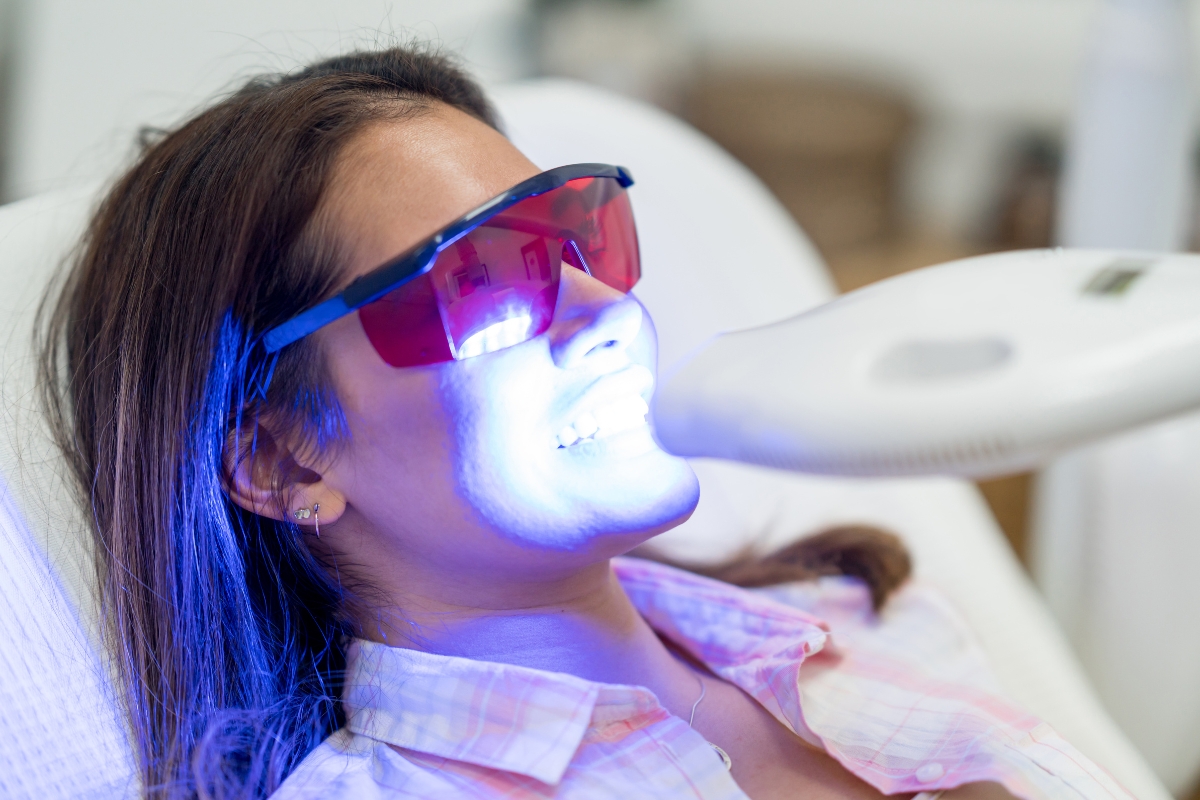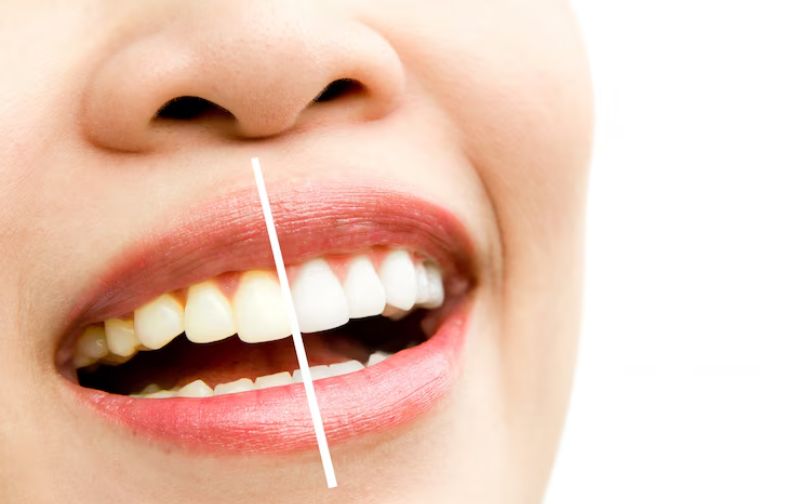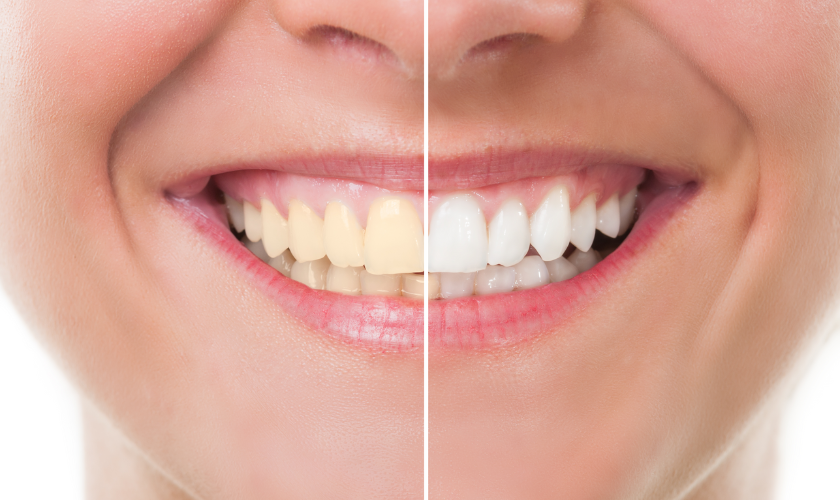
A gleaming white smile can boost your confidence and leave a lasting impression. Teeth whitening is a popular cosmetic dental procedure that helps achieve a brighter smile. However, while the whitening process brightens the surface enamel, maintaining good oral hygiene during this time is crucial for optimal results and overall oral health.
This blog delves into the world of teeth whitening and oral hygiene, providing essential tips to ensure a healthy, sparkling smile throughout the whitening process.
The Power of White: Unveiling Teeth Whitening Techniques
There are various teeth whitening options available, each with its own benefits and considerations. Here’s a quick overview:
- Professional Teeth Whitening: Performed by a dentist, professional whitening offers the most dramatic and long-lasting results. Techniques include in-office treatments and take-home whitening trays with dentist-prescribed bleaching agents.
- Over-the-Counter (OTC) Whitening Products: A wide range of OTC whitening products are available, including whitening strips, toothpaste, gels, and rinses. These offer milder results compared to professional treatments.
- Natural Whitening Methods: Some advocate for natural whitening methods like brushing with baking soda or using strawberry paste. However, the effectiveness of these methods is not scientifically proven and could potentially damage tooth enamel.
Regardless of the whitening method you choose, maintaining good oral hygiene is essential for optimal results and long-term smile health.
The Perfect Match: Oral Hygiene Habits for a Brighter, Healthier Smile
Here are some key oral hygiene practices to prioritize during your teeth whitening journey:
- Brushing Twice Daily: Maintain a consistent brushing routine twice daily for at least two minutes each time. Use a soft-bristled toothbrush and fluoride toothpaste to remove plaque and surface stains.
- Flossing Daily: Flossing once daily removes plaque and food particles from between teeth, preventing cavities and gum disease. This is especially important during whitening, as plaque buildup can hinder the whitening process.
- Focus on Brushing Technique: Brush gently using a circular motion, reaching all tooth surfaces, including the gum line and the back teeth. Don’t scrub too hard, as this can damage enamel.
- Consider a Tongue Scraper: Use a tongue scraper to remove bacteria and debris from the tongue, which can contribute to bad breath and affect taste perception.
- Stay Hydrated: Drinking plenty of water throughout the day helps flush away food particles and bacteria, promoting overall oral health and preventing stain buildup.
- Limit Staining Foods and Drinks: While whitening, it’s wise to limit consumption of coffee, tea, red wine, dark berries, and other stain-causing foods and beverages. If you do indulge, rinse your mouth thoroughly with water afterward.
- Maintain Regular Dental Checkups: Schedule regular dental checkups and cleanings throughout your whitening treatment and beyond. This allows your dentist to monitor your oral health and ensure the whitening process is progressing effectively.
By incorporating these oral hygiene practices into your routine, you can create a foundation for a healthy, radiant smile during teeth whitening and beyond.
Beyond the Basics: Advanced Tips for Optimal Whitening Results
Here are some additional tips to get the most out of your teeth whitening treatment:
- Follow the Instructions Carefully: Whether using professional or OTC whitening products, adhere to the manufacturer’s instructions or your dentist’s recommendations for optimal results and to avoid any potential side effects.
- Maintain a Healthy Diet: A balanced diet rich in fruits, vegetables, and calcium can promote overall oral health and potentially enhance the whitening process.
- Consider Sensitivity: If you experience tooth sensitivity during whitening, talk to your dentist. They might recommend using a desensitizing toothpaste or adjusting the whitening schedule.
- Touch-Up Treatments: Over time, teeth can naturally stain. Consider touch-up treatments to maintain your bright smile after achieving your desired results.
These additional tips can help you navigate the whitening process smoothly and achieve long-lasting results.
Understanding the Science: Why Oral Hygiene Matters During Whitening
Here’s why maintaining good oral hygiene is crucial during teeth whitening:
- Plaque and Stain Removal: Brushing and flossing effectively remove plaque and surface stains that can hinder the whitening agent from reaching the tooth enamel.
- Optimal Whitening Effect: A clean tooth surface allows the whitening agent to penetrate the enamel more effectively, resulting in a brighter smile.
- Reduced Risk of Gingivitis: Proper oral hygiene helps prevent gum inflammation (gingivitis). which can worsen during whitening due to increased gum sensitivity.
- Overall Oral Health: Maintaining good oral hygiene during whitening promotes overall oral health by preventing cavities, gum disease, and bad breath.
By understanding the science behind the importance of oral hygiene, you can make informed choices to optimize your whitening experience and maintain a healthy smile.
Addressing Concerns: Potential Side Effects of Teeth Whitening
Teeth whitening is generally safe for most people, but some potential side effects can occur, especially during the initial stages of treatment. Here’s what to watch out for:
- Tooth Sensitivity: You might experience temporary tooth sensitivity, particularly if you have sensitive teeth or use strong whitening products.
- Gum Irritation: Mild gum irritation can occur, especially if you don’t use whitening products correctly.
- Uneven Whitening: Existing dental work like crowns or veneers might not whiten as effectively as natural teeth, potentially leading to uneven results.
If you experience any concerning side effects that persist or worsen, it’s crucial to consult your dentist to discuss adjustments to your whitening routine.
A Brighter, Healthier You: The Benefits of Maintaining Oral Hygiene During Whitening
The benefits of maintaining good oral hygiene during teeth whitening extend beyond achieving a brighter smile. Here’s what you gain:
- Reduced Risk of Cavities: Regular brushing and flossing remove plaque bacteria that contribute to cavities, promoting long-term oral health.
- Fresher Breath: Proper oral hygiene prevents bad breath by reducing bacteria buildup on the tongue and teeth.
- Healthier Gums: Flossing and gentle brushing help maintain healthy gums, preventing gum disease and inflammation.
- Improved Overall Health: Good oral health has been linked to a reduced risk of various health problems, including heart disease and diabetes.
By prioritizing oral hygiene during teeth whitening, you invest in your overall health and well-being, not just a brighter smile.
A Winning Smile Starts with Healthy Habits
Teeth whitening can be a transformative experience, boosting your confidence and leaving a lasting impression. However, achieving optimal results requires a commitment to good oral hygiene practices throughout the process. By following the tips outlined in this blog, you can ensure a healthy, radiant smile that shines brightly, both figuratively and literally.
Remember, a dazzling smile is a reflection of overall oral health. Maintaining a consistent oral hygiene routine, coupled with professional guidance for whitening if needed, can help you achieve a smile you’ll love to share with the world!





